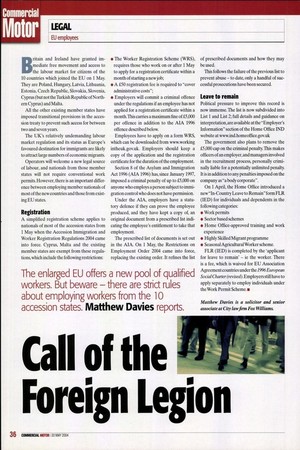Call of the
Page 34

If you've noticed an error in this article please click here to report it so we can fix it.
Foreign Legion
The enlarged EU offers a new pool of qualified workers. But beware — there are strict rules about employing workers from the 10
accession states. Matthew Davies reports.
Britain and Ireland have granted immediate free movement and access to the labour market for citizens of the 10 countries which joined the EU on 1 May. They are Poland, Hungary, Latvia, Lithuania, Estonia, Czech Republic, Slovakia, Slovenia, Cyprus (but not the Turkish Republic of Northem Cyprus) and Malta.
All the other existing member states have imposed transitional provisions in the accession treaty to prevent such access for between two and seven years.
The UK's relatively undemanding labour market regulation and its status as Europe's favoured destination for immigrants are likely to attract large numbers of economic migrants.
Operators will welcome a new legal source of labour, and nationals from those member states will not require conventional work permits. However, there is an important difference between employing member nationals of most of the new countries and those from existing EU states. Registration A simplified registration scheme applies to nationals of most of the accession states from 1 May when the Accession Immigration and Worker Registration Regulations 2004 came into force. Cyprus, Malta and the existing member states are exempt from these regulations, which include the following restrictions: • The Worker Registration Scheme (WRS), requires those who work on or after 1 May to apply for a registration certificate within a month of starting a new job; • A £50 registration fee is required to "cover administrative costs";
• Employers will commit a criminal offence under the regulations if an employee has not applied for a registration certificate within a month.This carries a maximum fine of £5,000 per offence in addition to the AIA 1996 offence described below.
Employees have to apply on a form WRS, which can be downloaded from www.working intheuk.gov.uk. Employers should keep a copy of the application and the registration certificate for the duration of the employment.
Section 8 of the Asylum and Immigration Act 1996 (AIA 1996) has, since January 1997, imposed a criminal penalty of up to £5,000 on anyone who employs a person subject to immigration control who does not have permission.
Under the AIA, employers have a statutory defence if they can prove the employee produced, and they have kept a copy of an original document from a prescribed list indicating the employee's entitlement to take that employment. The prescribed list of documents is set out in the AIA. On 1 May, the Restrictions on Employment Order 2004 came into force, replacing the existing order. It refines the list
of prescribed documents and how they may be used.
This follows the failure of the previous list to prevent abuse — to date, only a handful of successful prosecutions have been secured. Leave to remain Political pressure to improve this record is now immense. The list is now subdivided into List 1 and List 2; full details and guidance on interpretation, are available at the "Employer's Information" section of the Home Office IND website at www.ind.homeoffice.gov.uk
The government also plans to remove the £5,000 cap on the criminal penalty. This makes officers of an employer, and managers involved in the recruitment process, personally criminally liable for a potentially unlimited penalty. It is in addition to any penalties imposed on the company as "a body corporate". On 1 April, the Home Office introduced a new "In-Country Leave to Remain" form FLR (IED) for individuals and dependents in the following categories: • Work permits • Sector based schemes • Home Office-approved training and work experience • Highly Skilled Migrant programme
• Seasonal Agricultural Worker scheme. FLR (IED) is completed by the 'applicant for leave to remain' — ie the worker. There is a fee, which is waived for EU Association Agreement countries under the 1996 European Social Charter (revised). Employers still have to apply separately to employ individuals under the Work Permit Scheme. •




























































































































































































